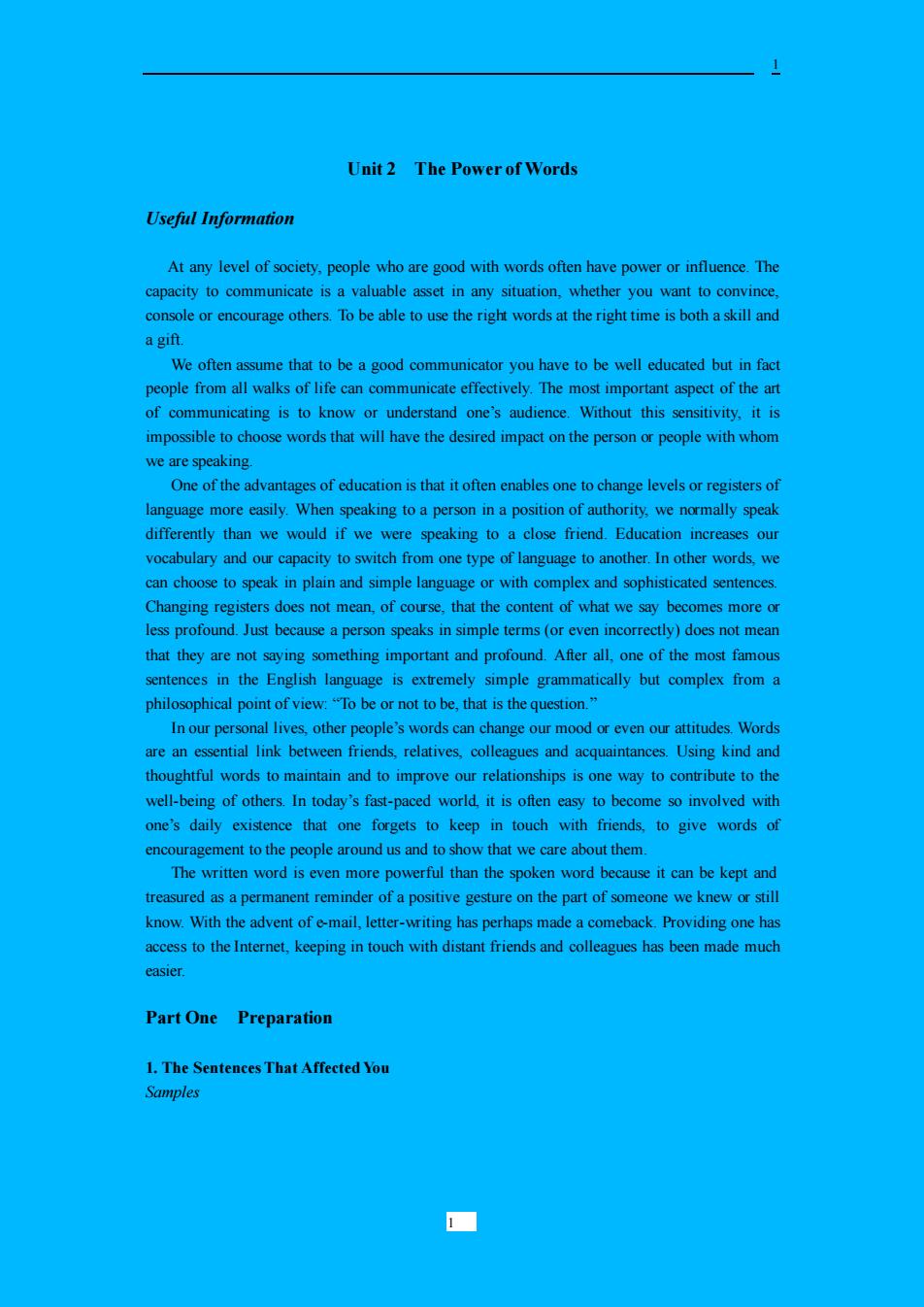
Unit 2 The Power of Words Useful Information At any level of society,people who are good with words often have power or influence.The capacity to communicate is a valuable asset in any situation,whether you want to convince, console or encourage others.To be able to use the right words at the right time is both a skill and a gift. We often assume that to be a good communicator you have to be well educated but in fact people from all walks of life can communicate effectively.The most important aspect of the art of communicating is to know or understand one's audience.Without this sensitivity,it is impossible to choose words that will have the desired impact on the person or people with whom we are speaking One of the advantages of education is that it often enables one to change levels or registers of language more easily.When speaking to a person in a position of authority,we normally speak differently than we would if we were speaking to a close friend.Education increases our vocabulary and our capacity to switch from one type of language to another.In other words,we can choose to speak in plain and simple language or with complex and sophisticated sentences. Changing registers does not mean,of course,that the content of what we say becomes more or less profound.Just because a person speaks in simple terms(or even incorrectly)does not mean that they are not saying something important and profound.After all,one of the most famous sentences in the English language is extremely simple grammatically but complex from a philosophical point of view:"To be or not to be,that is the question." In our personal lives,other people's words can change our mood or even our attitudes.Words are an essential link between friends,relatives,colleagues and acquaintances.Using kind and thoughtful words to maintain and to improve our relationships is one way to contribute to the well-being of others.In today's fast-paced world,it is often easy to become so involved with one's daily existence that one forgets to keep in touch with friends,to give words of encouragement to the people around us and to show that we care about them. The written word is even more powerful than the spoken word because it can be kept and treasured as a permanent reminder of a positive gesture on the part of someone we knew or still know.With the advent of e-mail,letter-writing has perhaps made a comeback.Providing one has access to the Internet,keeping in touch with distant friends and colleagues has been made much easier. Part One Preparation 1.The Sentences That Affected You Samples
1 1 Unit 2 The Power of Words Useful Information At any level of society, people who are good with words often have power or influence. The capacity to communicate is a valuable asset in any situation, whether you want to convince, console or encourage others. To be able to use the right words at the right time is both a skill and a gift. We often assume that to be a good communicator you have to be well educated but in fact people from all walks of life can communicate effectively. The most important aspect of the art of communicating is to know or understand one’s audience. Without this sensitivity, it is impossible to choose words that will have the desired impact on the person or people with whom we are speaking. One of the advantages of education is that it often enables one to change levels or registers of language more easily. When speaking to a person in a position of authority, we normally speak differently than we would if we were speaking to a close friend. Education increases our vocabulary and our capacity to switch from one type of language to another. In other words, we can choose to speak in plain and simple language or with complex and sophisticated sentences. Changing registers does not mean, of course, that the content of what we say becomes more or less profound. Just because a person speaks in simple terms (or even incorrectly) does not mean that they are not saying something important and profound. After all, one of the most famous sentences in the English language is extremely simple grammatically but complex from a philosophical point of view: “To be or not to be, that is the question.” In our personal lives, other people’s words can change our mood or even our attitudes. Words are an essential link between friends, relatives, colleagues and acquaintances. Using kind and thoughtful words to maintain and to improve our relationships is one way to contribute to the well-being of others. In today’s fast-paced world, it is often easy to become so involved with one’s daily existence that one forgets to keep in touch with friends, to give words of encouragement to the people around us and to show that we care about them. The written word is even more powerful than the spoken word because it can be kept and treasured as a permanent reminder of a positive gesture on the part of someone we knew or still know. With the advent of e-mail, letter-writing has perhaps made a comeback. Providing one has access to the Internet, keeping in touch with distant friends and colleagues has been made much easier. Part One Preparation 1. The Sentences That Affected You Samples
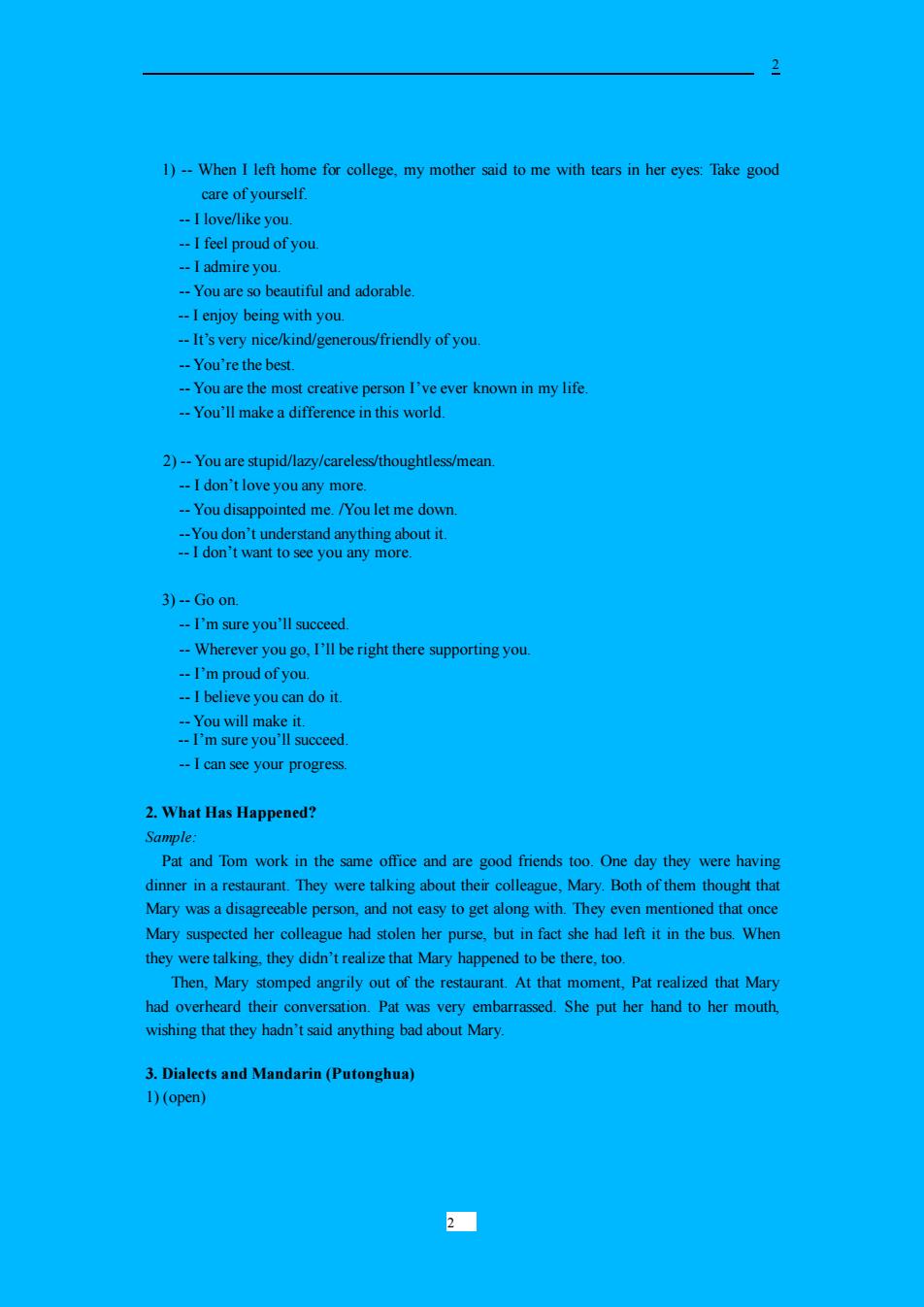
2 1)--When I left home for college,my mother said to me with tears in her eyes:Take good care of yourself. --I love/like you. --I feel proud of you. --I admire you. --You are so beautiful and adorable --I enjoy being with you. --It's very nice/kind/generous/friendly of you --You're the best. --You are the most creative person I've ever known in my life. --You'll make a difference in this world. 2)--You are stupid/lazy/careless/thoughtless/mean. --I don't love you any more. --You disappointed me./You let me down. --You don't understand anything about it. --I don't want to see you any more. 3)-G00n --I'm sure you'll succeed. --Wherever you go,I'll be right there supporting you. --I'm proud of you. --I believe you can do it. --You will make it. --I'm sure you'll succeed. --I can see your progress. 2.What Has Happened? Sample: Pat and Tom work in the same office and are good friends too.One day they were having dinner in a restaurant.They were talking about their colleague,Mary.Both of them thought that Mary was a disagreeable person,and not easy to get along with.They even mentioned that once Mary suspected her colleague had stolen her purse,but in fact she had left it in the bus.When they were talking,they didn't realize that Mary happened to be there,too. Then,Mary stomped angrily out of the restaurant.At that moment,Pat realized that Mary had overheard their conversation.Pat was very embarrassed.She put her hand to her mouth, wishing that they hadn't said anything bad about Mary. 3.Dialects and Mandarin (Putonghua) 1)(open) 2
2 2 1) -- When I left home for college, my mother said to me with tears in her eyes: Take good care of yourself. -- I love/like you. -- I feel proud of you. -- I admire you. -- You are so beautiful and adorable. -- I enjoy being with you. -- It’s very nice/kind/generous/friendly of you. -- You’re the best. -- You are the most creative person I’ve ever known in my life. -- You’ll make a difference in this world. 2) -- You are stupid/lazy/careless/thoughtless/mean. -- I don’t love you any more. -- You disappointed me. /You let me down. --You don’t understand anything about it. -- I don’t want to see you any more. 3) -- Go on. -- I’m sure you’ll succeed. -- Wherever you go, I’ll be right there supporting you. -- I’m proud of you. -- I believe you can do it. -- You will make it. -- I’m sure you’ll succeed. -- I can see your progress. 2. What Has Happened? Sample: Pat and Tom work in the same office and are good friends too. One day they were having dinner in a restaurant. They were talking about their colleague, Mary. Both of them thought that Mary was a disagreeable person, and not easy to get along with. They even mentioned that once Mary suspected her colleague had stolen her purse, but in fact she had left it in the bus. When they were talking, they didn’t realize that Mary happened to be there, too. Then, Mary stomped angrily out of the restaurant. At that moment, Pat realized that Mary had overheard their conversation. Pat was very embarrassed. She put her hand to her mouth, wishing that they hadn’t said anything bad about Mary. 3. Dialects and Mandarin (Putonghua) 1) (open)
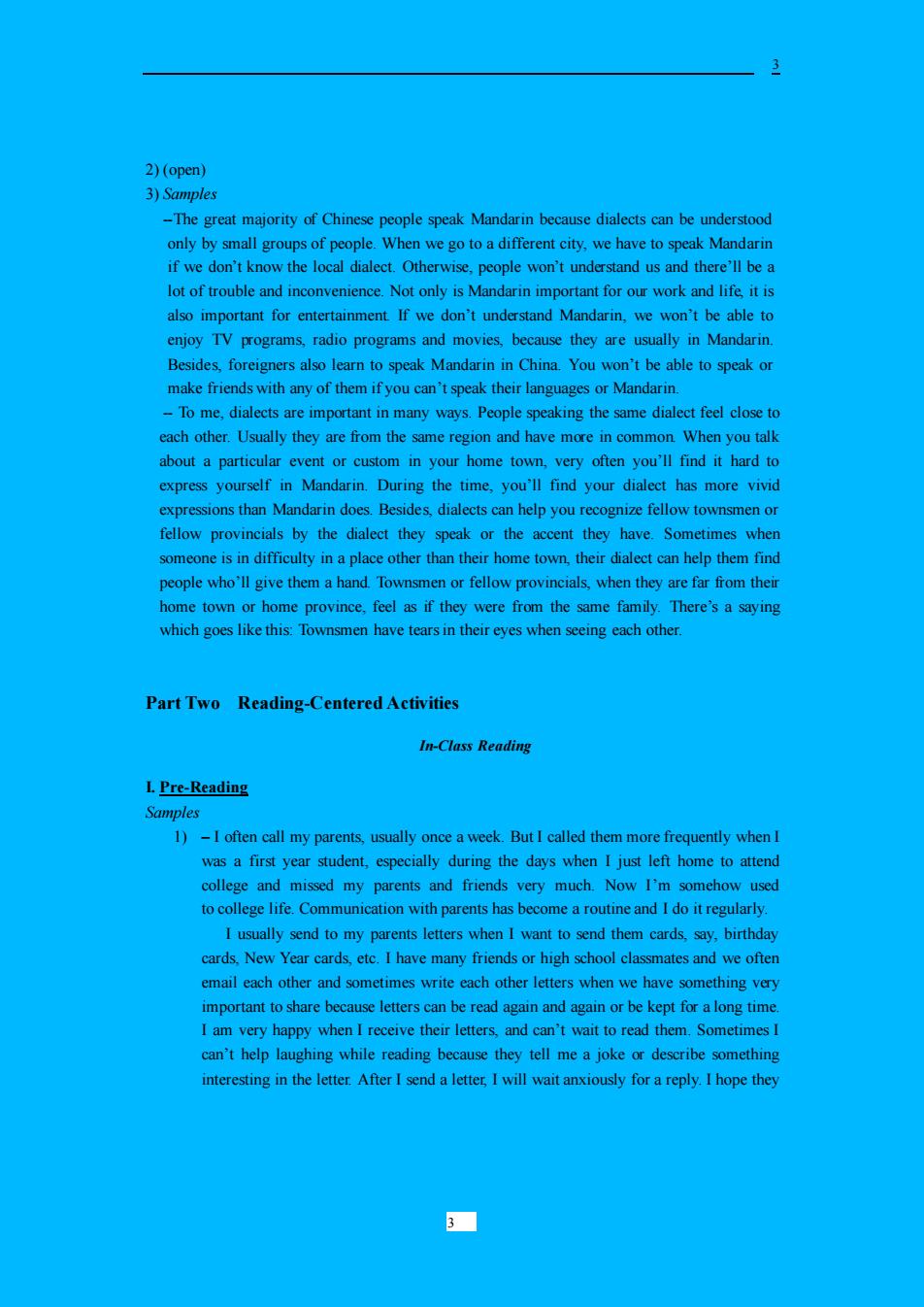
3 2)(open) 3)Samples -The great majority of Chinese people speak Mandarin because dialects can be understood only by small groups of people.When we go to a different city,we have to speak Mandarin if we don't know the local dialect.Otherwise,people won't understand us and there'll be a lot of trouble and inconvenience.Not only is Mandarin important for our work and life,it is also important for entertainment If we don't understand Mandarin,we won't be able to enjoy TV programs,radio programs and movies,because they are usually in Mandarin. Besides,foreigners also learn to speak Mandarin in China.You won't be able to speak or make friends with any of them if you can't speak their languages or Mandarin. -To me,dialects are important in many ways.People speaking the same dialect feel close to each other.Usually they are from the same region and have more in common.When you talk about a particular event or custom in your home town,very often you'll find it hard to express yourself in Mandarin.During the time,you'll find your dialect has more vivid expressions than Mandarin does.Besides,dialects can help you recognize fellow townsmen or fellow provincials by the dialect they speak or the accent they have.Sometimes when someone is in difficulty in a place other than their home town,their dialect can help them find people who'll give them a hand.Townsmen or fellow provincials,when they are far from their home town or home province,feel as if they were from the same family.There's a saying which goes like this:Townsmen have tears in their eyes when seeing each other. Part Two Reading-Centered Activities In-Class Reading I.Pre-Reading Samples 1)-I often call my parents,usually once a week.But I called them more frequently when I was a first year student,especially during the days when I just left home to attend college and missed my parents and friends very much.Now I'm somehow used to college life.Communication with parents has become a routine and I do it regularly. I usually send to my parents letters when I want to send them cards,say,birthday cards,New Year cards,etc.I have many friends or high school classmates and we often email each other and sometimes write each other letters when we have something very important to share because letters can be read again and again or be kept for a long time. I am very happy when I receive their letters,and can't wait to read them.Sometimes I can't help laughing while reading because they tell me a joke or describe something interesting in the letter.After I send a letter,I will wait anxiously for a reply.I hope they
3 3 2) (open) 3) Samples --The great majority of Chinese people speak Mandarin because dialects can be understood only by small groups of people. When we go to a different city, we have to speak Mandarin if we don’t know the local dialect. Otherwise, people won’t understand us and there’ll be a lot of trouble and inconvenience. Not only is Mandarin important for our work and life, it is also important for entertainment. If we don’t understand Mandarin, we won’t be able to enjoy TV programs, radio programs and movies, because they are usually in Mandarin. Besides, foreigners also learn to speak Mandarin in China. You won’t be able to speak or make friends with any of them if you can’t speak their languages or Mandarin. -- To me, dialects are important in many ways. People speaking the same dialect feel close to each other. Usually they are from the same region and have more in common. When you talk about a particular event or custom in your home town, very often you’ll find it hard to express yourself in Mandarin. During the time, you’ll find your dialect has more vivid expressions than Mandarin does. Besides, dialects can help you recognize fellow townsmen or fellow provincials by the dialect they speak or the accent they have. Sometimes when someone is in difficulty in a place other than their home town, their dialect can help them find people who’ll give them a hand. Townsmen or fellow provincials, when they are far from their home town or home province, feel as if they were from the same family. There’s a saying which goes like this: Townsmen have tears in their eyes when seeing each other. Part Two Reading-Centered Activities In-Class Reading I. Pre-Reading Samples 1) – I often call my parents, usually once a week. But I called them more frequently when I was a first year student, especially during the days when I just left home to attend college and missed my parents and friends very much. Now I’m somehow used to college life. Communication with parents has become a routine and I do it regularly. I usually send to my parents letters when I want to send them cards, say, birthday cards, New Year cards, etc. I have many friends or high school classmates and we often email each other and sometimes write each other letters when we have something very important to share because letters can be read again and again or be kept for a long time. I am very happy when I receive their letters, and can’t wait to read them. Sometimes I can’t help laughing while reading because they tell me a joke or describe something interesting in the letter. After I send a letter, I will wait anxiously for a reply. I hope they
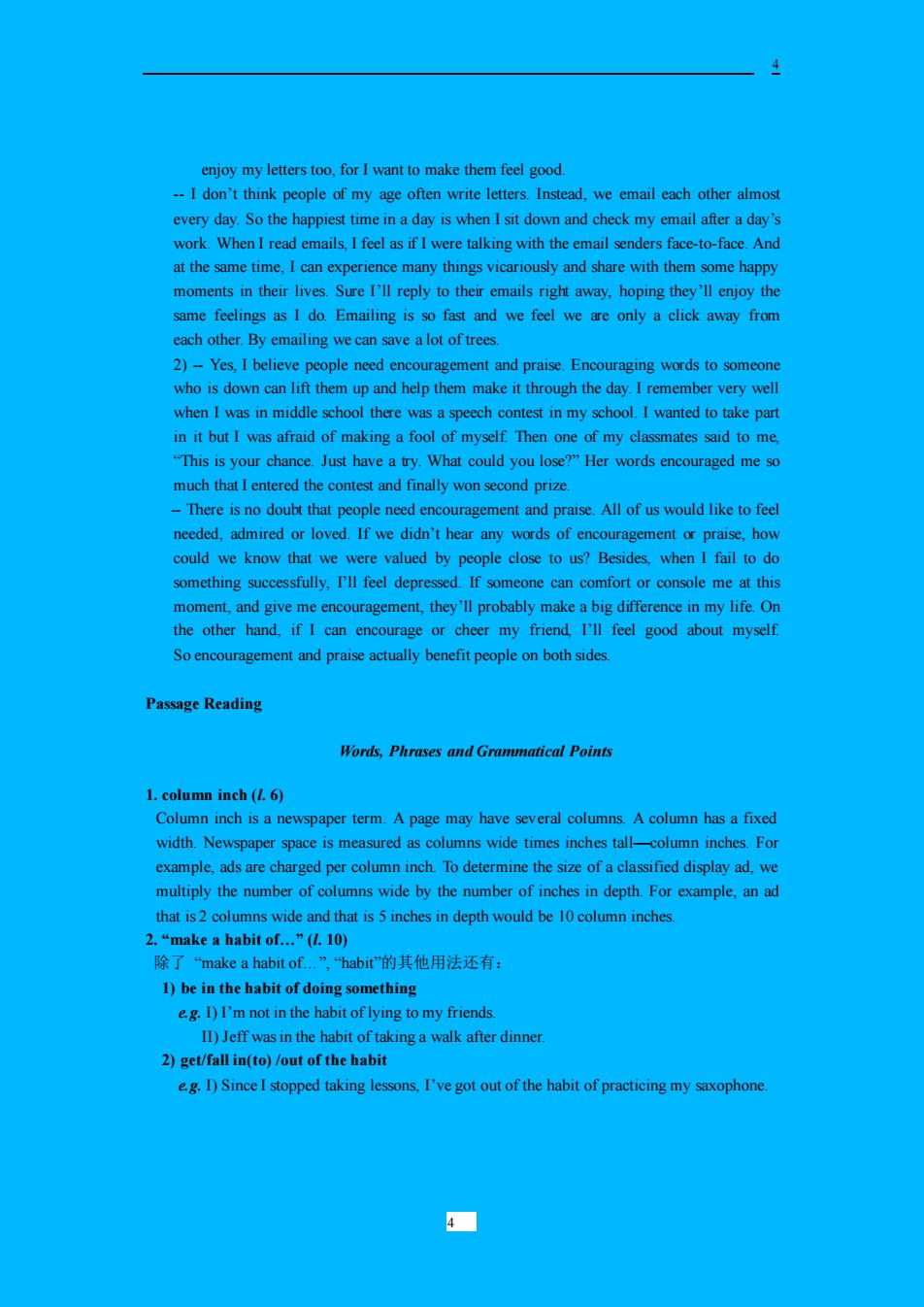
enjoy my letters too,for I want to make them feel good. --I don't think people of my age often write letters.Instead,we email each other almost every day.So the happiest time in a day is when I sit down and check my email after a day's work.When I read emails,I feel as if I were talking with the email senders face-to-face.And at the same time,I can experience many things vicariously and share with them some happy moments in their lives.Sure I'll reply to their emails right away,hoping they'll enjoy the same feelings as I do.Emailing is so fast and we feel we are only a click away from each other.By emailing we can save a lot of trees. 2)-Yes,I believe people need encouragement and praise.Encouraging words to someone who is down can lift them up and help them make it through the day.I remember very well when I was in middle school there was a speech contest in my school.I wanted to take part in it but I was afraid of making a fool of myself.Then one of my classmates said to me "This is your chance.Just have a try.What could you lose?"Her words encouraged me so much that I entered the contest and finally won second prize. -There is no doubt that people need encouragement and praise.All of us would like to feel needed,admired or loved.If we didn't hear any words of encouragement or praise,how could we know that we were valued by people close to us?Besides,when I fail to do something successfully,I'll feel depressed.If someone can comfort or console me at this moment,and give me encouragement,they'll probably make a big difference in my life.On the other hand,if I can encourage or cheer my friend,I'll feel good about myself So encouragement and praise actually benefit people on both sides. Passage Reading Words,Phrases and Grammatical Points 1.column inch (6) Column inch is a newspaper term.A page may have several columns.A column has a fixed width.Newspaper space is measured as columns wide times inches tall-column inches.For example,ads are charged per column inch.To determine the size of a classified display ad,we multiply the number of columns wide by the number of inches in depth.For example,an ad that is 2 columns wide and that is 5 inches in depth would be 10 column inches. 2.“make a habit of..”(U.10) 除了“make a habit of..”“habit'的其他用法还有: 1)be in the habit of doing something eg.I)I'm not in the habit of lying to my friends. II)Jeff was in the habit of taking a walk after dinner 2)get/fall in(to)/out of the habit eg.I)Since I stopped taking lessons,I've got out of the habit of practicing my saxophone 4
4 4 enjoy my letters too, for I want to make them feel good. -- I don’t think people of my age often write letters. Instead, we email each other almost every day. So the happiest time in a day is when I sit down and check my email after a day’s work. When I read emails, I feel as if I were talking with the email senders face-to-face. And at the same time, I can experience many things vicariously and share with them some happy moments in their lives. Sure I’ll reply to their emails right away, hoping they’ll enjoy the same feelings as I do. Emailing is so fast and we feel we are only a click away from each other. By emailing we can save a lot of trees. 2) -- Yes, I believe people need encouragement and praise. Encouraging words to someone who is down can lift them up and help them make it through the day. I remember very well when I was in middle school there was a speech contest in my school. I wanted to take part in it but I was afraid of making a fool of myself. Then one of my classmates said to me, “This is your chance. Just have a try. What could you lose?” Her words encouraged me so much that I entered the contest and finally won second prize. -- There is no doubt that people need encouragement and praise. All of us would like to feel needed, admired or loved. If we didn’t hear any words of encouragement or praise, how could we know that we were valued by people close to us? Besides, when I fail to do something successfully, I’ll feel depressed. If someone can comfort or console me at this moment, and give me encouragement, they’ll probably make a big difference in my life. On the other hand, if I can encourage or cheer my friend, I’ll feel good about myself. So encouragement and praise actually benefit people on both sides. Passage Reading Words, Phrases and Grammatical Points 1. column inch (l. 6) Column inch is a newspaper term. A page may have several columns. A column has a fixed width. Newspaper space is measured as columns wide times inches tall—column inches. For example, ads are charged per column inch. To determine the size of a classified display ad, we multiply the number of columns wide by the number of inches in depth. For example, an ad that is 2 columns wide and that is 5 inches in depth would be 10 column inches. 2. “make a habit of…” (l. 10) 除了 “make a habit of…”, “habit”的其他用法还有: 1) be in the habit of doing something e.g. I) I’m not in the habit of lying to my friends. II) Jeff was in the habit of taking a walk after dinner. 2) get/fall in(to) /out of the habit e.g. I) Since I stopped taking lessons, I’ve got out of the habit of practicing my saxophone
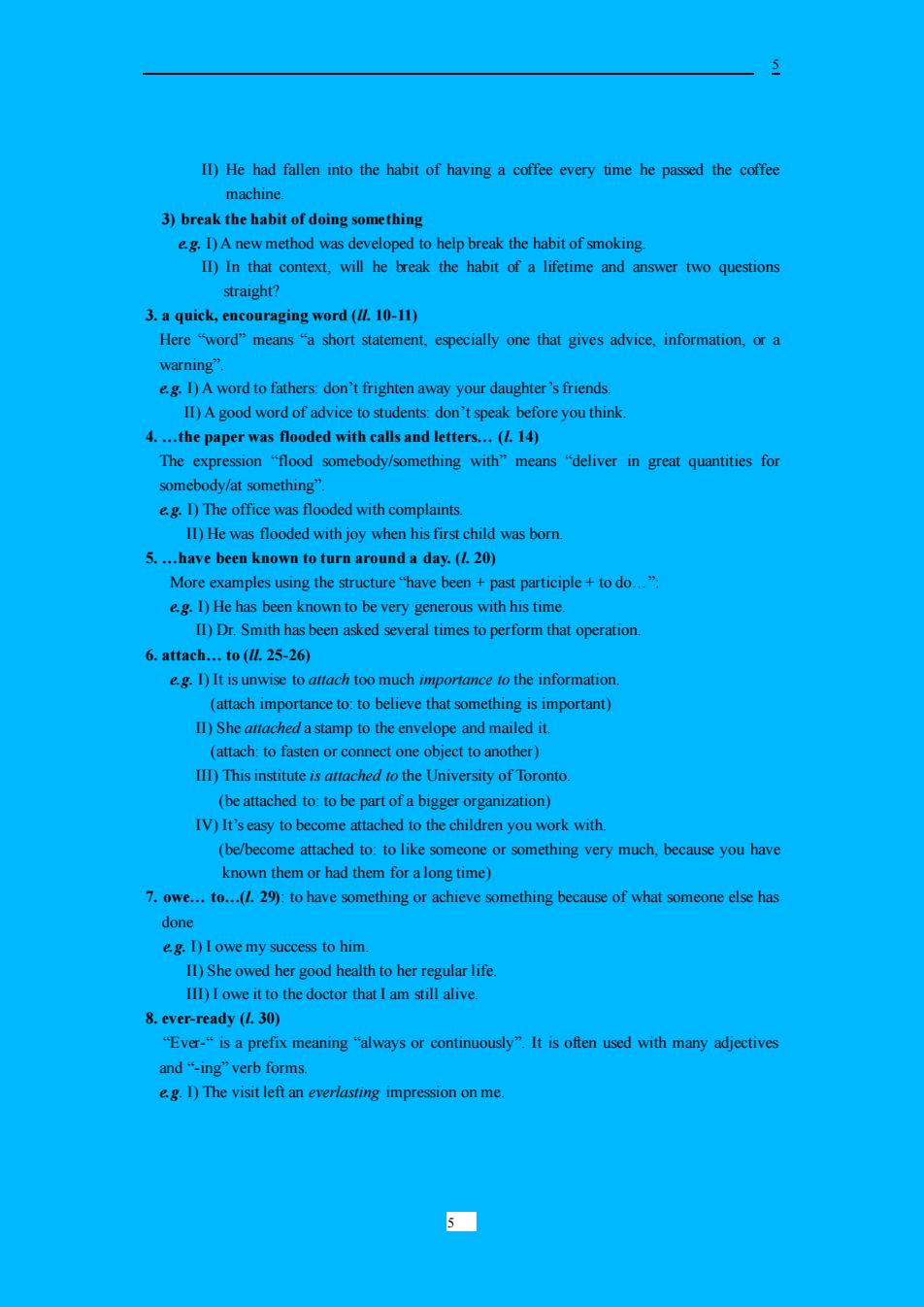
II)He had fallen into the habit of having a coffee every time he passed the coffee machine. 3)break the habit of doing something eg.I)A new method was developed to help break the habit of smoking. II)In that context,will he break the habit of a lifetime and answer two questions straight? 3.a quick,encouraging word (ll.10-11) Here "word"means "a short statement,especially one that gives advice,information,or a warning". eg.I)A word to fathers:don't frighten away your daughter's friends. II)A good word of advice to students:don't speak before you think. 4....the paper was flooded with calls and letters...(L.14) The expression "flood somebody/something with"means "deliver in great quantities for somebody/at something". eg.I)The office was flooded with complaints. Il)He was flooded with joy when his first child was born. 5....have been known to turn around a day.(L 20) More examples using the structure"have been+past participle+to do...". e.g.I)He has been known to be very generous with his time. II)Dr.Smith has been asked several times to perform that operation. 6.attach...to (I.25-26) e.g.I)It is unwise to attach too much importance to the information. (attach importance to:to believe that something is important) II)She attached a stamp to the envelope and mailed it. (attach:to fasten or connect one object to another) Ill)This institute is attached to the University of Toronto (be attached to:to be part of a bigger organization) IV)It's easy to become attached to the children you work with. (be/become attached to:to like someone or something very much,because you have known them or had them for a long time) 7.owe...to...(I.29):to have something or achieve something because of what someone else has done eg.I)I owe my success to him. Il)She owed her good health to her regular life. III)I owe it to the doctor that I am still alive. 8.ever-ready (I.30) “Ever-“is a prefix meaning“always or continuously”.It is often used with many adjectives and“-ing”verb forms. e.g.I)The visit left an everlasting impression on me. 5
5 5 II) He had fallen into the habit of having a coffee every time he passed the coffee machine. 3) break the habit of doing something e.g. I) A new method was developed to help break the habit of smoking. II) In that context, will he break the habit of a lifetime and answer two questions straight? 3. a quick, encouraging word (ll. 10-11) Here “word” means “a short statement, especially one that gives advice, information, or a warning”. e.g. I) A word to fathers: don’t frighten away your daughter’s friends. II) A good word of advice to students: don’t speak before you think. 4. …the paper was flooded with calls and letters… (l. 14) The expression “flood somebody/something with” means “deliver in great quantities for somebody/at something”. e.g. I) The office was flooded with complaints. II) He was flooded with joy when his first child was born. 5. …have been known to turn around a day. (l. 20) More examples using the structure “have been + past participle + to do…”: e.g. I) He has been known to be very generous with his time. II) Dr. Smith has been asked several times to perform that operation. 6. attach… to (ll. 25-26) e.g. I) It is unwise to attach too much importance to the information. (attach importance to: to believe that something is important) II) She attached a stamp to the envelope and mailed it. (attach: to fasten or connect one object to another) III) This institute is attached to the University of Toronto. (be attached to: to be part of a bigger organization) IV) It’s easy to become attached to the children you work with. (be/become attached to: to like someone or something very much, because you have known them or had them for a long time) 7. owe… to…(l. 29): to have something or achieve something because of what someone else has done e.g. I) I owe my success to him. II) She owed her good health to her regular life. III) I owe it to the doctor that I am still alive. 8. ever-ready (l. 30) “Ever-“ is a prefix meaning “always or continuously”. It is often used with many adjectives and “-ing” verb forms. e.g. I) The visit left an everlasting impression on me

II)The leaves of evergreens/evergreen trees are often shaped like needles. Ill)Perhaps the dread of cancer is ever-present. IV)The government was embarrassed by its ever-growing debt. V)The ever-changing colors of the sea have inspired many artists. 课内阅读参考译文 便笺的力量 我当体育编辑,最早是为蒙比利埃(俄亥俄州)的《企业导报》工作,当时我很少收 到体育迷的来信。因此,一天早晨放在我桌上的一封来信把我吸引住了。 2打开来信,我看到了下面的话:“关于老虎队的述评很不错,再接再厉。签名的是体 育编辑堂·沃尔夫。当时我只有十几岁(为每一竖栏写一英寸文字,稿酬总计达15美分), 因此他的话最鼓舞人心了。我把这封信一直放在书桌的抽屉里,后来它的边角都卷起来了。 每当我怀疑自己不是当作家的料时,重温一下堂的使笺,就又会树起信心来。 3后来,我逐渐对堂有所了解,知道给各行各业的人写快捷而鼓舞人心的便笺是他养成 的习惯。他告诉我说,“当我使别人充满信心时,自己也感觉好极了。” 4因此堂的朋友圈子就象附近的伊利湖那么大,这也不足为怪了。去年他去世了,享年 75岁。电话与悼函象潮水般地涌向报社,这些都来自于曾经得到过他的文字激励的人们。 5多年来,我努力效仿堂以及我的其他朋友,他们关心别人,常写一些鼓舞人心的话语, 因为我觉得,他们这样做是很有意义的。在这样一个惯于冷漠、无动于衷的世界上,这种 便笺给人们带来了温暖和慰藉。我们都时不时地需要鼓励,大家知道几行赞扬的话会改变 一个人的一天,甚至一生。 6那么,这些激励人心的便笺的作者为什么寥若晨星呢?我猜想很多人回避写,是因为 他们太看重人们的看法。他们担心会被误解,怕别人觉得他们自作多情或者言不由衷。还 有,写也要花时间,远不如打电话方便。 7 当然打电话的缺点是:说过的话留不住。而一张便笺使我们的良好意愿显得愈加珍贵。 便笺是白纸黑字记录在案的东西,而且我们写下的字可以反复阅读,细细品味并珍藏起来。 8尽管写便笺会多花一些时间,但一些非常忙的人也在这么做,其中包括乔治布什。有 人说,他政治上的成功在很大程度上归功于他那枝随时准备写字的笔。这是怎么回事呢? 在他整个职业生涯中,每次与人们接触之后,他几乎都随后写封信,内容亲切一一句赞 美之辞,一行表扬的话,或一段感谢语。他不仅写给朋友和同事,还写给萍水相逢的人以 及完全陌生的人一比如那位借伞给他的人,后来收到他热情的赞扬信,感到很惊讶。 9那些通常做作的公司高层经理们,其领导作风只能被形容为强硬、冷漠、脱离群众。 甚至这些人也开始学习写便笺去鼓舞人心,且从中获益匪浅。唐纳德彼得森,福特公司的 前主席,把每天写便笺鼓励同事当作一件日常工作。该公司在20世纪80年代时走出低谷 取得成功主要是他的功劳。“我只不过匆匆地在备忘录或信的角上写一些鼓舞人心的话, 然后传递出去,”他说道。“每天最重要的一段时间,就是鼓舞那些为你工作的人的那10 分钟。” 10 “太多的时候,”他说,“那些我们真正喜欢的人并不知道我们是怎么看待他们的。太 多的时候,我们会以为,我并没有说过什么批评的话,为什么非得去说好话呢?我们忘了, 人类需要正面的肯定或鼓励一事实上,我们靠这个取得进步,获得成功!” 山怎样才能写出振奋精神、温暖人心的信呢?只需要我们愿意表达我们的赏识之意。 写这种便笺的高手都具有我所谓的“4S技巧。 6
6 6 II) The leaves of evergreens/evergreen trees are often shaped like needles. III) Perhaps the dread of cancer is ever-present. IV) The government was embarrassed by its ever-growing debt. V) The ever-changing colors of the sea have inspired many artists. 课内阅读参考译文 便笺的力量 1 我当体育编辑,最早是为蒙比利埃(俄亥俄州)的《企业导报》工作,当时我很少收 到体育迷的来信。因此,一天早晨放在我桌上的一封来信把我吸引住了。 2 打开来信,我看到了下面的话:“关于老虎队的述评很不错,再接再厉。”签名的是体 育编辑堂·沃尔夫。当时我只有十几岁(为每一竖栏写一英寸文字,稿酬总计达 15 美分), 因此他的话最鼓舞人心了。我把这封信一直放在书桌的抽屉里,后来它的边角都卷起来了。 每当我怀疑自己不是当作家的料时,重温一下堂的便笺,就又会树起信心来。 3 后来,我逐渐对堂有所了解,知道给各行各业的人写快捷而鼓舞人心的便笺是他养成 的习惯。他告诉我说,“当我使别人充满信心时,自己也感觉好极了。” 4 因此堂的朋友圈子就象附近的伊利湖那么大,这也不足为怪了。去年他去世了,享年 75 岁。电话与悼函象潮水般地涌向报社,这些都来自于曾经得到过他的文字激励的人们。 5 多年来,我努力效仿堂以及我的其他朋友,他们关心别人,常写一些鼓舞人心的话语, 因为我觉得,他们这样做是很有意义的。在这样一个惯于冷漠、无动于衷的世界上,这种 便笺给人们带来了温暖和慰藉。我们都时不时地需要鼓励,大家知道几行赞扬的话会改变 一个人的一天,甚至一生。 6 那么,这些激励人心的便笺的作者为什么寥若晨星呢?我猜想很多人回避写,是因为 他们太看重人们的看法。他们担心会被误解,怕别人觉得他们自作多情或者言不由衷。还 有,写也要花时间,远不如打电话方便。 7 当然打电话的缺点是:说过的话留不住。而一张便笺使我们的良好意愿显得愈加珍贵。 便笺是白纸黑字记录在案的东西,而且我们写下的字可以反复阅读,细细品味并珍藏起来。 8 尽管写便笺会多花一些时间,但一些非常忙的人也在这么做,其中包括乔治·布什。有 人说,他政治上的成功在很大程度上归功于他那枝随时准备写字的笔。这是怎么回事呢? 在他整个职业生涯中,每次与人们接触之后,他几乎都随后写封信,内容亲切——一句赞 美之辞,一行表扬的话,或一段感谢语。他不仅写给朋友和同事,还写给萍水相逢的人以 及完全陌生的人——比如那位借伞给他的人,后来收到他热情的赞扬信,感到很惊讶。 9 那些通常做作的公司高层经理们,其领导作风只能被形容为强硬、冷漠、脱离群众。 甚至这些人也开始学习写便笺去鼓舞人心,且从中获益匪浅。唐纳德·彼得森,福特公司的 前主席,把每天写便笺鼓励同事当作一件日常工作。该公司在 20 世纪 80 年代时走出低谷 取得成功主要是他的功劳。“我只不过匆匆地在备忘录或信的角上写一些鼓舞人心的话, 然后传递出去,”他说道。“每天最重要的一段时间,就是鼓舞那些为你工作的人的那 10 分钟。” 10 “太多的时候,”他说,“那些我们真正喜欢的人并不知道我们是怎么看待他们的。太 多的时候,我们会以为,我并没有说过什么批评的话,为什么非得去说好话呢?我们忘了, 人类需要正面的肯定或鼓励——事实上,我们靠这个取得进步,获得成功!” 11 怎样才能写出振奋精神、温暖人心的信呢?只需要我们愿意表达我们的赏识之意。 写这种便笺的高手都具有我所谓的“4S”技巧
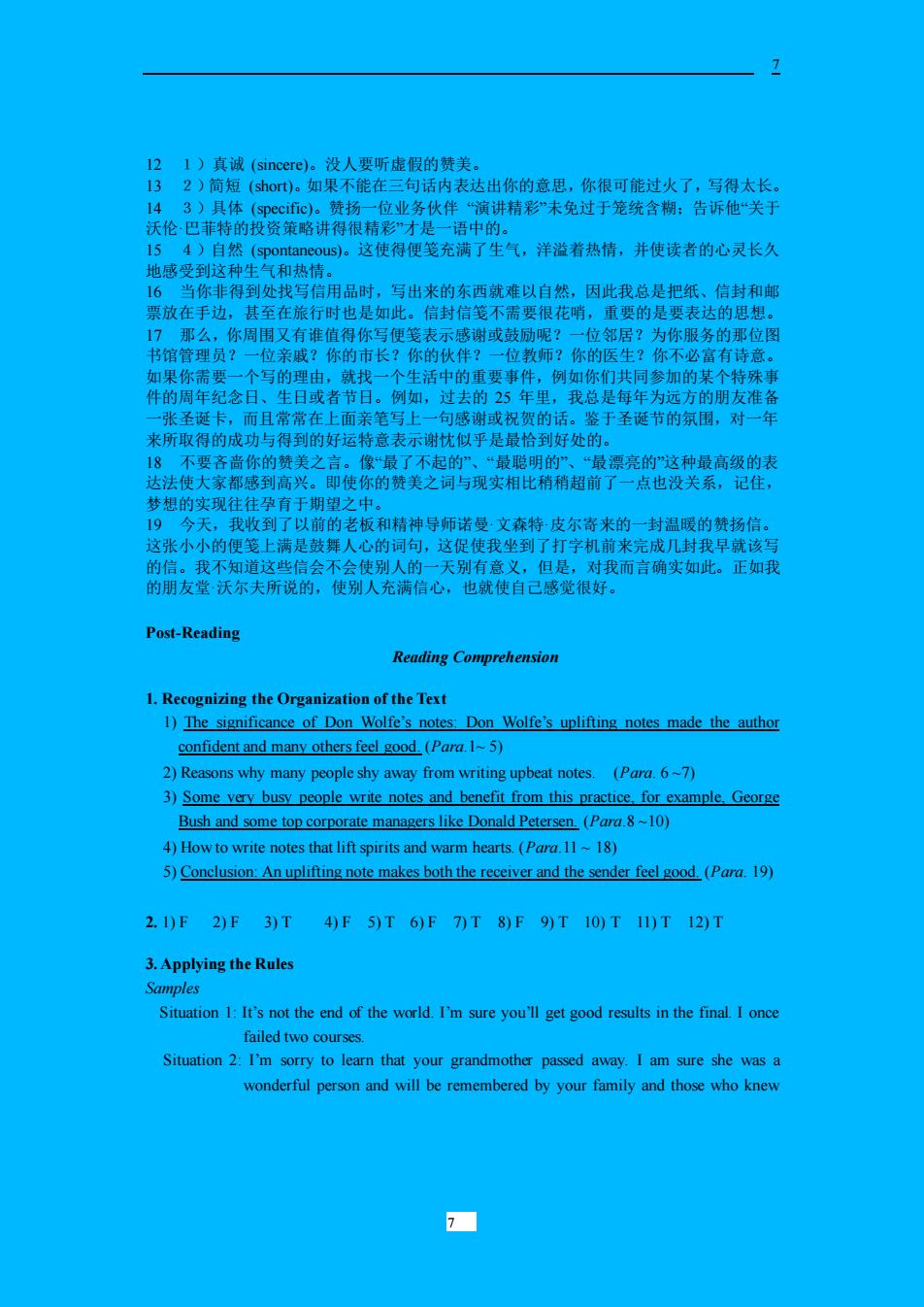
121)真诚(sincere)。没人要听虚假的赞美。 132)简短(shot)。如果不能在三句话内表达出你的意思,你很可能过火了,写得太长。 143)具体(specific)。赞扬一位业务伙伴“演讲精彩未免过于笼统含糊:告诉他“关于 沃伦巴菲特的投资策略讲得很精彩”才是一语中的。 154)自然(spontaneous))。这使得便笺充满了生气,洋溢着热情,并使读者的心灵长久 地感受到这种生气和热情。 16当你非得到处找写信用品时,写出来的东西就难以自然,因此我总是把纸、信封和邮 票放在手边,甚至在旅行时也是如此。信封信笺不需要很花哨,重要的是要表达的思想。 17那么,你周围又有谁值得你写使笺表示感谢或鼓励呢?一位邻居?为你服务的那位图 书馆管理员?一位亲戚?你的市长?你的伙伴?一位教师?你的医生?你不必富有诗意。 如果你需要一个写的理由,就找一个生活中的重要事件,例如你们共同参加的某个特殊事 件的周年纪念日、生日或者节日。例如,过去的25年里,我总是每年为远方的朋友准备 一张圣诞卡,而且常常在上面亲笔写上一句感谢或祝贺的话。鉴于圣诞节的氛围,对一年 来所取得的成功与得到的好运特意表示谢忱似乎是最恰到好处的。 18不要吝啬你的赞美之言。像“最了不起的”、“最聪明的”、“最漂亮的”这种最高级的表 达法使大家都感到高兴。即使你的赞美之词与现实相比稍稍超前了一点也没关系,记住, 梦想的实现往往孕育于期望之中。 19今天,我收到了以前的老板和精神导师诺曼·文森特·皮尔寄来的一封温暖的赞扬信。 这张小小的便笺上满是鼓舞人心的词句,这促使我坐到了打字机前来完成几封我早就该写 的信。我不知道这些信会不会使别人的一天别有意义,但是,对我而言确实如此。正如我 的朋友堂沃尔夫所说的,使别人充满信心,也就使自己感觉很好。 Post-Reading Reading Comprehension 1.Recognizing the Organization of the Text 1)The significance of Don Wolfe's notes:Don Wolfe's uplifting notes made the author confident and many others feel good.(Para.1~5) 2)Reasons why many people shy away from writing upbeat notes.(Para.6~7) 3)Some very busy people write notes and benefit from this practice,for example.George Bush and some top corporate managers like Donald Petersen.(Para.8~10) 4)How to write notes that lift spirits and warm hearts.(Para.11~18) 5)Conclusion:An uplifting note makes both the receiver and the sender feel good.(Para.19) 2.1)F2)F3)T4)F5)T6)F7)T8)F9)T10)T11)T12)T 3.Applying the Rules Samples Situation 1:It's not the end of the world.I'm sure you'll get good results in the final.I once failed two courses Situation 2:I'm sorry to learn that your grandmother passed away.I am sure she was a wonderful person and will be remembered by your family and those who knew 7
7 7 12 1)真诚 (sincere)。没人要听虚假的赞美。 13 2)简短 (short)。如果不能在三句话内表达出你的意思,你很可能过火了,写得太长。 14 3)具体 (specific)。赞扬一位业务伙伴 “演讲精彩”未免过于笼统含糊;告诉他“关于 沃伦·巴菲特的投资策略讲得很精彩”才是一语中的。 15 4)自然 (spontaneous)。这使得便笺充满了生气,洋溢着热情,并使读者的心灵长久 地感受到这种生气和热情。 16 当你非得到处找写信用品时,写出来的东西就难以自然,因此我总是把纸、信封和邮 票放在手边,甚至在旅行时也是如此。信封信笺不需要很花哨,重要的是要表达的思想。 17 那么,你周围又有谁值得你写便笺表示感谢或鼓励呢?一位邻居?为你服务的那位图 书馆管理员?一位亲戚?你的市长?你的伙伴?一位教师?你的医生?你不必富有诗意。 如果你需要一个写的理由,就找一个生活中的重要事件,例如你们共同参加的某个特殊事 件的周年纪念日、生日或者节日。例如,过去的 25 年里,我总是每年为远方的朋友准备 一张圣诞卡,而且常常在上面亲笔写上一句感谢或祝贺的话。鉴于圣诞节的氛围,对一年 来所取得的成功与得到的好运特意表示谢忱似乎是最恰到好处的。 18 不要吝啬你的赞美之言。像“最了不起的”、“最聪明的”、“最漂亮的”这种最高级的表 达法使大家都感到高兴。即使你的赞美之词与现实相比稍稍超前了一点也没关系,记住, 梦想的实现往往孕育于期望之中。 19 今天,我收到了以前的老板和精神导师诺曼·文森特·皮尔寄来的一封温暖的赞扬信。 这张小小的便笺上满是鼓舞人心的词句,这促使我坐到了打字机前来完成几封我早就该写 的信。我不知道这些信会不会使别人的一天别有意义,但是,对我而言确实如此。正如我 的朋友堂·沃尔夫所说的,使别人充满信心,也就使自己感觉很好。 Post-Reading Reading Comprehension 1. Recognizing the Organization of the Text 1) The significance of Don Wolfe’s notes: Don Wolfe’s uplifting notes made the author confident and many others feel good. (Para.1~ 5) 2) Reasons why many people shy away from writing upbeat notes. (Para. 6 ~7) 3) Some very busy people write notes and benefit from this practice, for example, George Bush and some top corporate managers like Donald Petersen. (Para.8 ~10) 4) How to write notes that lift spirits and warm hearts. (Para.11 ~ 18) 5) Conclusion: An uplifting note makes both the receiver and the sender feel good. (Para. 19) 2. 1) F 2) F 3) T 4) F 5) T 6) F 7) T 8) F 9) T 10) T 11) T 12) T 3. Applying the Rules Samples Situation 1: It’s not the end of the world. I’m sure you’ll get good results in the final. I once failed two courses. Situation 2: I’m sorry to learn that your grandmother passed away. I am sure she was a wonderful person and will be remembered by your family and those who knew

8 her Situation 3:Happy Birthday!You are the sweetest person in the world.I miss your company and look forward to seeing you again in holidays. Situation 4:You are always the best in my eye.Time can cure everything.Be brave! Situation 5:Congratulations!What a good beginning.I wish you success. Vocabulary 1.Creating Compound Words STEP ONE: Column A Column B The compound words created up eared upbeat,uplift draw ready drawback hand conscious handwritten rag back rag-eared ever beat ever-ready over lift overdue self due self-conscious mile stone milestone type wishing typewriter,typewritten well writer/written well-wishing,well-written STEP TWO: 1)upbeat 2)ever-ready 3)overdue 4)typewriter 5)milestone 6)handwritten 7)uplifted 8)self-conscious 9)rag-eared 10)drawbacks 2.1)A.intrigued v:interest B.intrigues n the act or practice of secretly planning to harm someone or make them lose their position of power 2)A.straining try very hard to do something using all your physical or mental strength B.strain n.a force that stretches,pulls or puts pressure on something 3)A.savor n.taste;flavor B.savored v enjoy the taste or flavor of:enjoy as much as you can 4)A.treasure w:treat something as being very special,important,or valuable B.treasure n.a store of gold,silver,jewels,etc. 5)A.credited consider...as having achieved something or being the reason for it B.credit n.trust:faith 6)A.boost n.an encouraging act of cheering somebody up 8
8 8 her. Situation 3: Happy Birthday! You are the sweetest person in the world. I miss your company and look forward to seeing you again in holidays. Situation 4: You are always the best in my eye. Time can cure everything. Be brave! Situation 5: Congratulations! What a good beginning. I wish you success. Vocabulary 1. Creating Compound Words STEP ONE: Column A Column B The compound words created up eared upbeat, uplift draw ready drawback hand conscious handwritten rag back rag-eared ever beat ever-ready over lift overdue self due self-conscious mile stone milestone type wishing typewriter, typewritten well writer/written well-wishing, well-written STEP TWO: 1) upbeat 2) ever-ready 3) overdue 4) typewriter 5) milestone 6) handwritten 7) uplifted 8) self-conscious 9) rag-eared 10) drawbacks 2. 1) A. intrigued v. interest B. intrigues n. the act or practice of secretly planning to harm someone or make them lose their position of power 2) A. straining v. try very hard to do something using all your physical or mental strength B. strain n. a force that stretches, pulls or puts pressure on something 3) A. savor n. taste; flavor B. savored v. enjoy the taste or flavor of; enjoy as much as you can 4) A. treasure v. treat something as being very special, important, or valuable B. treasure n. a store of gold, silver, jewels, etc. 5) A. credited v. consider… as having achieved something or being the reason for it B. credit n. trust; faith 6) A. boost n. an encouraging act of cheering somebody up
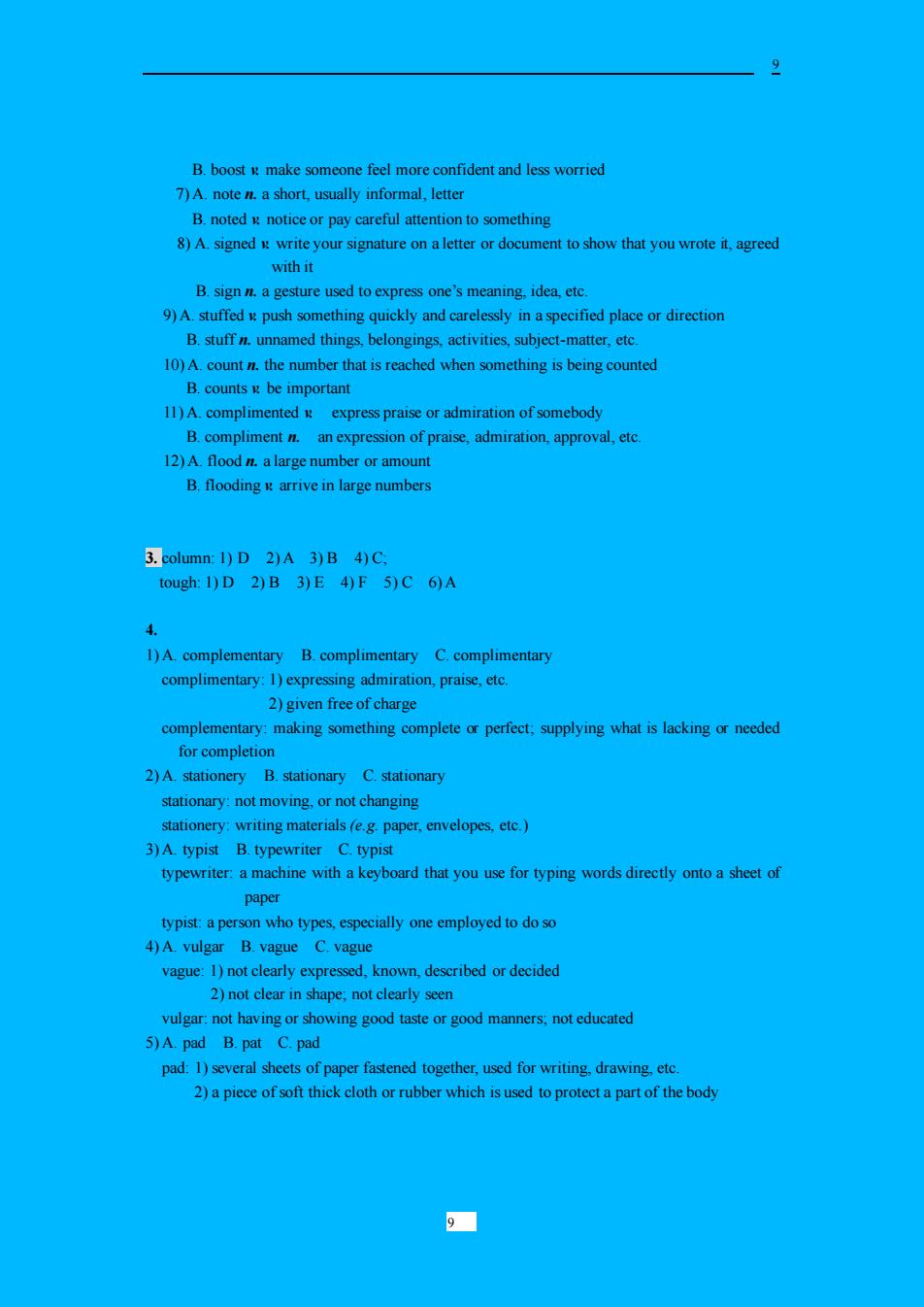
B.boost make someone feel more confident and less worried 7)A.note n.a short,usually informal,letter B.noted v notice or pay careful attention to something 8)A.signed write your signature on a letter or document to show that you wrote it,agreed with it B.sign n.a gesture used to express one's meaning,idea,etc. 9)A.stuffed push something quickly and carelessly in a specified place or direction B.stuffn.unnamed things,belongings,activities,subject-matter,etc. 10)A.count n.the number that is reached when something is being counted B.counts w be important 11)A.complimented express praise or admiration of somebody B.compliment n.an expression of praise,admiration,approval,etc. 12)A.flood n.a large number or amount B.flooding v arrive in large numbers 3.column:1)D 2)A 3)B 4)C; tough:1)D 2)B 3)E 4)F 5)C 6)A 4. 1)A.complementary B.complimentary C.complimentary complimentary:1)expressing admiration,praise,etc. 2)given free of charge complementary:making something complete or perfect;supplying what is lacking or needed for completion 2)A.stationery B.stationary C.stationary stationary:not moving,or not changing stationery:writing materials(e.g.paper,envelopes,etc.) 3)A.typist B.typewriter C.typist typewriter:a machine with a keyboard that you use for typing words directly onto a sheet of paper typist:a person who types,especially one employed to do so 4)A.vulgar B.vague C.vague vague:1)not clearly expressed,known,described or decided 2)not clear in shape;not clearly seen vulgar:not having or showing good taste or good manners,not educated 5)A.pad B.pat C.pad pad:1)several sheets of paper fastened together,used for writing,drawing,etc. 2)a piece of soft thick cloth or rubber which is used to protect a part of the body 9
9 9 B. boost v. make someone feel more confident and less worried 7) A. note n. a short, usually informal, letter B. noted v. notice or pay careful attention to something 8) A. signed v. write your signature on a letter or document to show that you wrote it, agreed with it B. sign n. a gesture used to express one’s meaning, idea, etc. 9) A. stuffed v. push something quickly and carelessly in a specified place or direction B. stuff n. unnamed things, belongings, activities, subject-matter, etc. 10) A. count n. the number that is reached when something is being counted B. counts v. be important 11) A. complimented v. express praise or admiration of somebody B. compliment n. an expression of praise, admiration, approval, etc. 12) A. flood n. a large number or amount B. flooding v. arrive in large numbers 3. column: 1) D 2) A 3) B 4) C; tough: 1) D 2) B 3) E 4) F 5) C 6) A 4. 1) A. complementary B. complimentary C. complimentary complimentary: 1) expressing admiration, praise, etc. 2) given free of charge complementary: making something complete or perfect; supplying what is lacking or needed for completion 2) A. stationery B. stationary C. stationary stationary: not moving, or not changing stationery: writing materials (e.g. paper, envelopes, etc.) 3) A. typist B. typewriter C. typist typewriter: a machine with a keyboard that you use for typing words directly onto a sheet of paper typist: a person who types, especially one employed to do so 4) A. vulgar B. vague C. vague vague: 1) not clearly expressed, known, described or decided 2) not clear in shape; not clearly seen vulgar: not having or showing good taste or good manners; not educated 5) A. pad B. pat C. pad pad: 1) several sheets of paper fastened together, used for writing, drawing, etc. 2) a piece of soft thick cloth or rubber which is used to protect a part of the body

10 a pat on the back:praise for something that you have done well 6)A.own B.owed C.owes D.owned owe:1)have to pay for something already done or given 2)feel grateful own:1)a.belonging to oneself and to no one else 2)v.possess (something),especially by lawful right 5. 1)solution 2)wasted 3)hidden 4)dumb 5)subject 6)noise 7)extra 8)replaced 9)appreciation 10)strange After-Class Reading 课外阅读参考译文 美言尽在其中 】我当时在明尼苏达州莫里斯市的圣玛丽学校任教,马克·埃克隆是我教的三年级一班 的学生。全班34个学生都和我很亲密,但马克确是百里挑一。他衣冠整洁,一副乐天派 的样子,即便偶尔调皮一下,也显得那么可爱。 2马克上课时还会说个不停。我只得一次次提醒他,未经允许是不可以讲话的。然而, 每次我不得不纠正他的捣乱行为时,他的反应总是那么真诚,这给我留下了深刻的印象。 “谢谢您纠正我的行为,好老师!“起初我不明白他的话到底什么意思,可是不久我就习惯 了,每天都听他这么说好多遍。 3一天上午,当马克又在不停地说话时,我没了耐心,于是犯了一个见习教师会犯的错 误。我看着马克说道:“如果你再说一个字,我就用胶带把你的嘴封住!” 4不到十秒钟就听见查克突然嚷起来,“马克又说话了。”我之前并没有让任何学生帮 我看着马克,可是既然我已经在全班面前讲了我的惩罚办法,就要说到做到。 5我还记得那时的情景,就好像是今天上午才刚刚发生的。我当时走到自己的桌前,不 慌不忙地拉开抽屉,拿出一卷遮蔽胶带,接着一言不发地走到马克桌前,撕下两条胶带, 在他的嘴上贴成一个大大的叉。然后我又回到教室的前面。 6当我瞥了马克一眼想看看他的反应时,他对我眨了眨眼。他得逞了!我笑了起来。我 回到马克的桌旁,撕掉了贴在他嘴上的胶带,无可奈何地耸了耸肩,这时全班都欢呼起来。 撕掉胶带后他说的第一句话是:“谢谢您纠正我的行为,好老师。” 7那年年底的时候我被安排去教初中数学。时光飞逝,不知不觉中马克又坐在了我的教 室里。他比过去更英俊了,而且还是那么彬彬有礼。因为不得不仔细听我讲解“新数学, 九年级的马克不再像在三年级时那么爱讲话了。 8有个星期五,情况使人感到有点不对头。整整一周我们都在学习一个新概念。我感觉 到学生们开始泄气了,而且彼此之间变得急躁易怒。我得改变一下班级的气氛以免情况失 控。于是我让学生把班上其他同学的名字列在两张纸上,在名字之间留出些空间。然后我 让他们想出对于每个同学的最好的评价,并把它写下来。 10
10 10 a pat on the back: praise for something that you have done well 6) A. own B. owed C. owes D. owned owe: 1) have to pay for something already done or given 2) feel grateful own: 1) a. belonging to oneself and to no one else 2) v. possess (something), especially by lawful right 5. 1) solution 2) wasted 3) hidden 4) dumb 5) subject 6) noise 7) extra 8) replaced 9) appreciation 10) strange After-Class Reading 课外阅读参考译文 美言尽在其中 1 我当时在明尼苏达州莫里斯市的圣玛丽学校任教,马克·埃克隆是我教的三年级一班 的学生。全班 34 个学生都和我很亲密,但马克确是百里挑一。他衣冠整洁,一副乐天派 的样子,即便偶尔调皮一下,也显得那么可爱。 2 马克上课时还会说个不停。我只得一次次提醒他,未经允许是不可以讲话的。然而, 每次我不得不纠正他的捣乱行为时,他的反应总是那么真诚,这给我留下了深刻的印象。 “谢谢您纠正我的行为,好老师!”起初我不明白他的话到底什么意思,可是不久我就习惯 了,每天都听他这么说好多遍。 3 一天上午,当马克又在不停地说话时,我没了耐心,于是犯了一个见习教师会犯的错 误。我看着马克说道:“如果你再说一个字,我就用胶带把你的嘴封住!” 4 不到十秒钟就听见查克突然嚷起来,“马克又说话了。” 我之前并没有让任何学生帮 我看着马克,可是既然我已经在全班面前讲了我的惩罚办法,就要说到做到。 5 我还记得那时的情景,就好像是今天上午才刚刚发生的。我当时走到自己的桌前,不 慌不忙地拉开抽屉,拿出一卷遮蔽胶带,接着一言不发地走到马克桌前,撕下两条胶带, 在他的嘴上贴成一个大大的叉。然后我又回到教室的前面。 6 当我瞥了马克一眼想看看他的反应时,他对我眨了眨眼。他得逞了!我笑了起来。我 回到马克的桌旁,撕掉了贴在他嘴上的胶带,无可奈何地耸了耸肩,这时全班都欢呼起来。 撕掉胶带后他说的第一句话是:“谢谢您纠正我的行为,好老师。” 7 那年年底的时候我被安排去教初中数学。时光飞逝,不知不觉中马克又坐在了我的教 室里。他比过去更英俊了,而且还是那么彬彬有礼。因为不得不仔细听我讲解“新数学”, 九年级的马克不再像在三年级时那么爱讲话了。 8 有个星期五,情况使人感到有点不对头。整整一周我们都在学习一个新概念。我感觉 到学生们开始泄气了,而且彼此之间变得急躁易怒。我得改变一下班级的气氛以免情况失 控。于是我让学生把班上其他同学的名字列在两张纸上,在名字之间留出些空间。然后我 让他们想出对于每个同学的最好的评价,并把它写下来